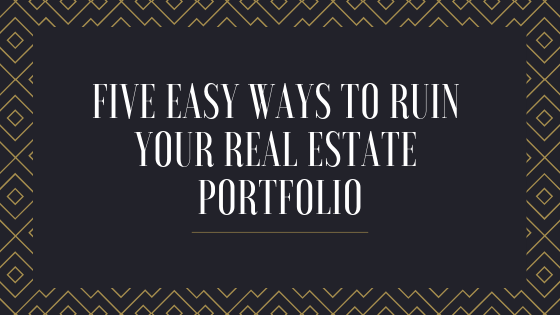At one point or another, we’ve heard that building a real estate portfolio equates to passive income. This is not true. There is work to be done in creating a solid real estate portfolio, which can provide passive income depending on your investments. If you solely invest in rentals, then you will receive passive income. That is not to say that it won’t cost you upfront in time and money. Before you jump into the real estate market (or proceed further), you should be aware of how easy it can be to ruin a real estate portfolio. Let’s take a look at five ways.
- Buying in the wrong area. When you are researching a neighborhood, you should find out if other investors have avoided it and why. Also, if you would not live in the neighborhood yourself, then don’t make the purchase. You may decide to live the house you are trying to flip or rent.
- Going it alone at first. When you are just starting out, it is beneficial to join a real estate investors group. This group includes real estate investors, contractors, real estate lawyers and property managers. You will learn from them as well as not invest a great deal of money at first. It’s also a great way to make valuable relationships!
- Not diversifying. When you put all your eggs into one basket, you are losing out on other opportunities. And you won’t lose all your eggs at one time. We see this done with other investments, so why not with real estate assets? You can invest in REITs, rentals or even flip houses.
- Not using financing. Most people aren’t aware of the different financing options for real estate investments. When people pay in cash (usually for their first property), they are not giving themselves the financial flexibility needed for the investment, especially when it comes to emergency maintenance or if they have to cover a mortgage payment due to a vacancy. They are also missing out on a bigger return on investment with purchasing more than property (1 unit vs. 10 units). It’s recommended to pay 20% cash and the rest through financing.
- Not reserving money for additional costs. When investing in a property, most only think about the down payment and the closing costs. They fail to realize the other costs involved as well as put money aside for them. These costs include homeowner association fees, property management fees and insurance.
